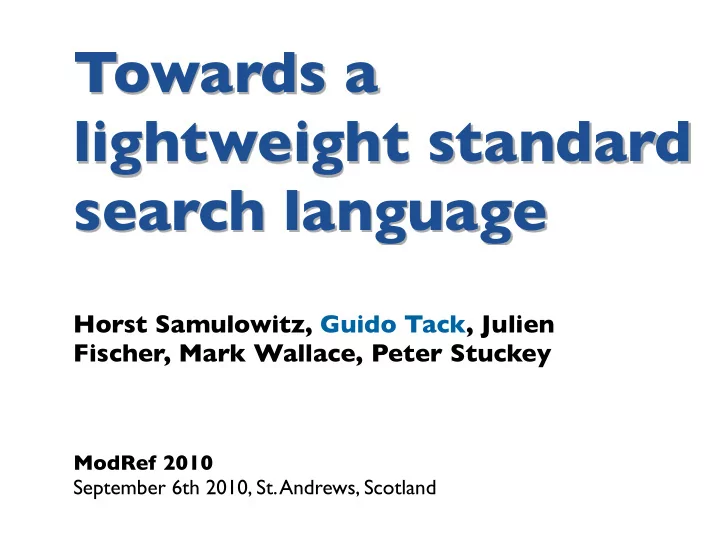

Towards a lightweight standard search language Horst Samulowitz, Guido Tack, Julien Fischer, Mark Wallace, Peter Stuckey ModRef 2010 September 6th 2010, St. Andrews, Scotland
Goals • Define a search language for MiniZinc • Lightweight: Balance expressiveness with ease of implementation • Basis for discussion and (eventually) wide adoption
Why custom search? • Standard labeling sometimes not good enough • Exploit problem structure - problem decomposition • Combine search procedures - restarts, warm starts, backdoors, portfolios...
Why standard language? • Compare different solvers and searches • Exchange models (e.g. CSPLib) • Communicate search strategies (e.g. papers) • Fix good names (independent of adoption as a standard!)
Approach • Not: fully programmable search (too complex) • Language for combining predefined search strategies • Library of search templates that define the strategies
Simple labeling variables Template: {int,bool,set}_search( vars,varsel,domsplit ) variable selection domain splitting varsel ≡ input_order, random_order, {min,max}_{lb,ub}, {min,max}_dom_size, {min,max}_dom_size_weighted_degree, ... domsplit ≡ {assign,exclude}_{lb,ub}, bisect_{low,high}, {assign,exclude}_impact_{min,max}, ...
Limit Strategies limit_search( measure,limit,search ) fails, nodes, solutions, time, discrepancies once( search ) ≡ limit(solutions,1, search ) lds( d,search ) ≡ limit(discrepancies, d , search ) restart_geometric( inc,init,measure,search ) restart_luby( init,max,measure,search )
Composition Sequential search: seq_search( [search1,...,searchN] ) search1 and search2 Parallel search: par_search( [search1,...,searchN] ) or search1 search2
Example: Job Shop constraint forall (i in 1..size) ( forall (j in 1..size-1) (s[i,j]+d[i,j] <= s[i,j+1]) /\ s[i,size] + d[i,size] <= end /\ forall (j,k in 1..size where j < k) ( no_overlap(s[j,i], d[j,i], s[k,i], d[k,i]) ) ); solve :: search minimize end; Search annotation
Example: Job Shop Simple dom/wdeg search: search ≡ int_search(s, min_dom_size_weighted_degree, bisect_low) Find first solution with LDS, then prove optimality with IBS: search ≡ par_search([ lds(3, int_search(s,min_lb,assign_lb)), int_search(s, max_impact, assign_impact_min)])
Example: Radiotherapy var 0..Ints_sum : Beamtime; var 0..m*n : K; array [BTimes] of var 0..m*n : N; array [Rows, Columns, BTimes] of var 0..m*n : Q; constraint � � Beamtime = sum(b in BTimes) (b * N[b]) /\ � � K = sum(b in BTimes) (N[b]) /\ � � forall(i in Rows, j in Columns) � � ( Intensity[i,j] = sum([b * Q[i,j,b] | b in BTimes]) ) /\ � � forall(i in Rows, b in BTimes) � � ( ub_i(N[b], [Q[i,j,b] | j in Columns]) ); predicate ub_i( var int: N_b, array [ int ] of var int: L) = � N_b >= L[1] + sum([ max(L[j] - L[j-1], 0) | j in 2..n ]); solve :: search minimize (ub(K) + 1) * Beamtime + K;
Problem decomposition Observation: after labeling the N, each row in the Q is independent first search N seq_search search ≡ int_search N Q [1] once int_search if one row fails, [2] once int_search Q backtrack into N once [3] int_search Q once [4] int_search Q
Problem decomposition Observation: after labeling the N, each row in the Q is independent first search N search ≡ search ≡ seq_search( seq_search if one row fails, [int_search(N, min_dom_size_weighted_degree, int_search N backtrack into N bisect_low)] ++ [once(int_search( once int_search [Q[i,j,b] | j in Cols, b in BTimes], Q max_activity, bisect_activity_min)) | i in Rows])
Problem decomposition Observation: after labeling the N, each row in the Q is independent search ≡ seq_search( [int_search(N, min_dom_size_weighted_degree, bisect_low)] ++ [once(int_search( [Q[i,j,b] | j in Cols, b in BTimes], max_activity, bisect_activity_min)) | i in Rows])
Implementation • Two prototypes for FlatZinc/Gecode - code generator - C++ library • Many templates implemented • Generic approach, (hopefully) easy to adapt to other CP solvers
Future work • Full implementation • Define interaction with concurrent search • Symmetry breaking? • Shaving? • Local search?
Conclusions • Combinators and templates are expressive enough for useful, complex custom searches • Proposed language can be implemented • Useful as a standard: compare, exchange, communicate search strategies • Independent of concrete modeling language: let's fix good names
Recommend
More recommend